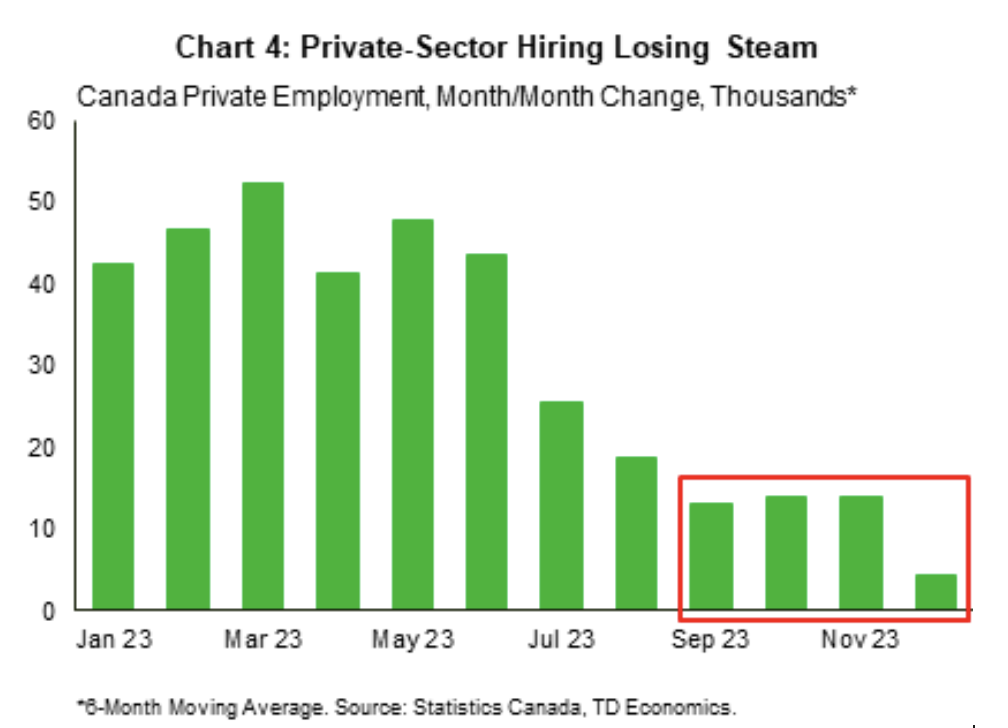Ah, the classic Canadian summer. The season of sunshine, ice cream, and… unemployment?
Seriously, what happened to those lovely summer gigs of the past when eager Canadian teens would flock to quaint shops and buzzing tourist hubs with carefree smiles and arms overflowing with resumes? (And get hired on the spot.)
Well, kiss those days goodbye because we’re not living in the 1950’s anymore and the traditional summer job is becoming a thing of the past in Canada, mostly thanks to the dismal state of the labour market.
Now, what used to be a rite of passage for many young Canadians is now a rare and elusive opportunity which makes many feel like there’s no Canadian summer jobs anymore.
And it’s not just the youth who are suffering. The labour market decline affects everyone who is looking for a job, whether it’s full-time, part-time, or seasonal. It also has severe consequences for the economy, as it reduces consumer spending, tax revenues, and business growth.

Reason 1. A Cooling Down of Canada’s Private Sector Hiring and Labour Markets
So, how bad is the situation for Canada’s labour market?
Cue the sad violin music because TD Bank’s economist Mark Ercalao just dropped the economic equivalent of a tear-jerking Nicholas Sparks novel with his depressing mid-year labour forecast. According to Mark’s brutally honest reporting, Canada’s once hearty employment landscape now resembles the Gobi desert due to factors reducing job prospects to a crisp.
The report predicts that the labour market will continue to cool in 2024, with unemployment rates rising across the nation. Based on the report, the unemployment rate will rise from 5.8% in 2023 to 6.3% in 2024, with most of the increase occurring in the first half. The hardest hit sectors will be the private ones.

Manufacturing, construction, and retail, have already seen a slowdown in hiring in recent months and are a key player in why it’s increasingly feeling like there’s no Canadian summer jobs left.
The most affected provinces will be Ontario, Quebec, and BC, which have the largest shares of private-sector employment and the highest immigration rates.
These provinces will also face the brunt of the housing market correction, which will further dampen consumer spending and confidence.
Are there Really No Canadian Summer Jobs Left? Looking at the Word on the Street
If TD’s hard truths weren’t tough enough to swallow, click over to Reddit’s r/TorontoJobs subreddit for some real-talk testimonials showing us just how nightmarish the job search has become based for literally anyone in Toronto who’s not in Skilled Trades or Healthcare.
Take a scroll through this subreddit. You can see that many job seekers share their frustrations and challenges in finding employment, even in sectors that used to be relatively easy to access, such as bartending or any entry-level job really:

For example, one user posted a question asking if the job market is really that bad and received a lot of responses confirming the difficulty of landing a job in Toronto. Some of the comments include:
- “Yes, been bad for some time.”
- “Best to network your way into a job here. It’s a lot about who you know.”
- “Pretty bad. Prepare yourself mentally for a lot of rejections. Get lots of help.”
- “Let’s just say the gig economy is hiring.”
- “My work has people with master’s degrees applying. We make $16 an hour.”
Even tapping into traditionally accessible summer roles proved challenging, according to comments. One cautioned that “summer will be even worse because that’s when university kids will be on break. Maybe try something in your field.” While another shared their experience: “My local bar…has a new bartender every few months… most people want ‘Canadian experience’ if you come from out of the country.”
These examples show the reality and the struggle of many job seekers in Canada, who are facing a shrinking and saturated labour market. So, while saying that there are ‘no Canadian summer jobs‘ might be an overstatement, it’s not too far from the truth as a once common and enjoyable way to earn some money and gain some experience, is now a rare and elusive opportunity.
Reason 2. Impact of Large Immigration Targets on the Labour Market
What are the main factors behind Canada’s labour market decline and the disappearance of the summer job? One of them are the large immigration targets and the industries around them that have popped up making international immigration to Canada a booming business.
One of the primary culprits blamed for saturating the labour market is Canada’s approach to tackling its aging population challenges – through mass immigration.
Each year, hundreds of thousands of new arrivals are welcomed in a bid to boost the size of the working population.
However, amid rising unemployment, questions are being raised over whether this strategy simply adds more job seekers faster than jobs can be created.
As one Redditor pointed out, these new arrivals are a source of “cheaper labour,” incentivizing employers to hire immigrants over native-born Canadians lacking experience. With inbound workers outpacing hiring, it’s created a perfect recipe for the current musical chairs job market.
Why you can’t find a job!
byu/dj_kingmarkus intorontoJobs
Reason 3. Higher Interest Rates and Inflation in Canada
In an effort to tamp down Canada’s rising inflation, the Bank of Canada has significantly raised interest rates. This strategy, while important in managing the economy’s overall temperature, has had the unintended effect of putting a brake on economic growth.
Funnily enough, the rising cost of borrowing is a central factor here for the Canadian summer job. With higher interest rates, companies, especially those on the fringes of financial stability, are finding it increasingly challenging to finance growth initiatives or consider new hires.
This reality hits harder for sectors heavily reliant on loans, such as startups and innovative enterprises typically responsible for a substantial portion of new job creation.

Moreover, these increased borrowing costs have forced many businesses to revisit and tighten their budgets and spending strategies for 2024.
Companies, grappling with the costlier burden of servicing existing debts, are turning to stringent measures such as layoffs and hiring freezes to just stay afloat, hence our tightened job market, where opportunities, especially for summer jobs are becoming scarcer.
Mixing this economic policy with a high immigration rate, adds fog to the Summer Job search for both new incoming students and locala. While immigration brings in new talent and potential to drive economic growth, in a situation where businesses are already reeling from financial tightening, the flow of new labour can exacerbate the competition for small number of job openings.
The culmination of these monetary policies and market dynamics has thus not only squeezed the supply side of the job market but also ramped up demand.
Consequently, the pursuit to stabilize the economy through monetary policy interventions has inadvertently led to a tougher job landscape for young Canadians and students seeking summer employment in 2024.
Potential Solutions
While Ontario and British Columbia contend with swirling undercurrents of unemployment, job seekers can cast hopeful lines into provinces boasting better fortunes. Based on TD’s projections, areas like Alberta, Manitoba and Nova Scotia could offer smoother sailing with steady growth across sectors thanks to public infrastructure projects firing on all cylinders.
Additionally, strategic industry shifts could buoy prospects for those open to pivoting careers. Healthcare, education and skilled trades remain bright beacons for recruitment despite the foggy economy. Peruse local colleges to learn unto-demand skills and qualify for hard-to-fill openings quicker amid fewer applicants. Or tap networks through informational interviews to uncover unadvertised vacancies.
Finally, if unrelenting disappointment lingers, Canadians ought not to rule out expanding horizons beyond borders. Countries like Germany, Singapore, Australia and more post much rosier job forecasts in months ahead. Just be sure to polish up resumes to align with global standards and research relevant visas to smooth transitions abroad!
Protecting Your Financial Future by Leaving Canada
It’s clear that Canada’s labour market has taken a significant turn for the worse in recent times. Factors like rising inflation, our cost of living crisis, and higher for longer interest rates, though intended to address other issues, have actually increased unemployment and reduced job opportunities throughout the year in Canada. This crisis has even extended to jeopardizing what was once a summer rite of passage for Canadian youth – holding a part-time or seasonal job in the sunny season.
As the evidence shows through reports and real experiences, job hunting in Canada has become a significant challenge regardless of career stage or sector. Therefore, those struggling may be wise to consider new options like seeking roles in provinces with steadier growth, shifting to in-demand fields, tapping contacts for inside leads, or even exploring international relocation if the domestic situation proves fruitless.
If you’re interested in the latter, you’ve come to the right place. Our goal is to help out Canadians, or anyone else, live their dream abroad. A dream which is increasingly hard to create here in the Great White North. To start your journey in finding your next home out of Canada, take our Leaving Canada Quiz below, and you’ll find the right country for you and your family based on 22 parameters.
Looking to leave Canada?
Take the country quiz to see where you belong!

Leave a Reply